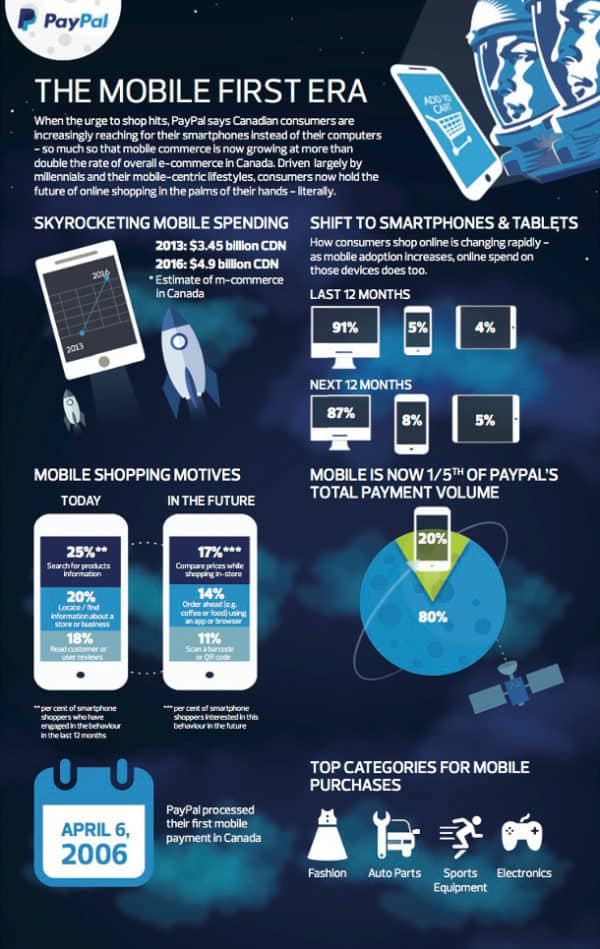
 A recent study from PayPal and Ipsos demonstrates that Canadians are increasingly shopping with mobile devices, and that businesses who lag in catering to them with mobile-first solutions are missing out on potential revenue.
A recent study from PayPal and Ipsos demonstrates that Canadians are increasingly shopping with mobile devices, and that businesses who lag in catering to them with mobile-first solutions are missing out on potential revenue.
The study, conducted by Ipsos for PayPal, interviewed 17,519 people online in 22 countries, including the UK, France, Germany, Austria, Switzerland, Italy, Spain, Netherlands, Sweden, Norway, Denmark, Poland, Turkey, Russia, Israel, UAE, USA, Canada, Brazil, Mexico, China and Australia between September 9 and November 3, 2014.
The study points out that mobile commerce is growing at more than double the rate of regular e-commerce, with a compound annual growth rate of 42%, compared to 13% for e-commerce, accounting for $3.5 billion in 2013 and projected to reach $4.9 billion by 2016.
Although the study poses the question “What’s holding consumers back?”, it’s obvious that the hold-up isn’t the result of any kind of reluctance on the part of consumers but instead of business’ inability to supply mobile solutions.
Cantech Letter asked Alexander Peh, head of mobile and market development at PayPal Canada, about that gap between consumer willingness and business’ ability to respond. “You may have heard this before – ‘fish where the fish are’,” he said. “By not selling online, businesses are clearly missing out on access to Canadian and international shoppers who love the convenience of shopping online or on their mobile devices.”
Obviously, this growth in mobile commerce is being fueled by the Millennial demographic’s adoption of new technology, as 30% of them report making a purchase on their phone at least once a week compared with 17% for all demographics combined.
Millennials, between 18 and 34 years old, account for only 31% of total online shoppers and 52% of smartphone shoppers. But they more than compensate for the comparative lack of mobile activity for older demographics. Only 19% of online shoppers across all demographics report making a purchase through their phone in the past 12 months.
There isn’t any particular mental shift on the part of Millennials that points to their adoption of mobile technology. The same factors that have always driven regular brick-and-mortar commerce are merely reinforced by technology. Convenience and speed win out across all demographics, with design considerations that emphasize creating a seamless shopping experience, often mentioned by Frank & Oak as their driving principle, separating companies who grow from those struggling to keep up.
Speaking of keeping up, the Canadian Internet Registration Authority points out that in 2014, only 41% of small businesses even have a website, while 74% of Canadians report searching online either to make a purchase or to research before buying.
The good news, then, is that if you’re a business already employing a mobile-first strategy, you’re ahead of the curve.
“We are at the dawn of a mobile-first era. The winners will be the ones who offer the most genuine value in the long run.” – Alexander Peh, head of mobile and market development at PayPal Canada
Alexander Peh reports seeing mobile growth among PayPal users rise from less than 1% of payment volume in 2010 to more than 20 per cent in 2014.
“We are at the dawn of a mobile-first era,” he said. “There’s enough room in the mobile commerce market for multiple players. There’s no silver bullet solution. The winners will be the ones who offer the most genuine value in the long run.”
Putting mobile first for many businesses will likely entail creating an app, as opposed to a site experienced through a browser on a mobile device, since the PayPal/Ipsos study also found that 46% of Canadian smartphone shoppers prefer shopping on an app, compared to 14% who prefer a browser.
“We strive to make our Indigo mobile app and mobile friendly online store a fantastic shopping experience for our customers. Mobile is a critical component of Indigo’s strategy and we’re constantly looking at ways to continue to innovate and add value through this platform,” said Lauren Reimer, Vice President Online Merchandising and Marketing, Indigo Books & Music Inc.
As the Business Bank of Canada points out, only 18% of Canadian small businesses sell online, while 80% of Canadians report researching a product before buying, and 51% actually shopping online.
Consumers, as always, are driven towards businesses who can supply their needs when and where they want. The longer businesses wait, the more consumers seek out the competition.
As a global leading payment processor, PayPal is better situated than most to evaluate trends in e-commerce. PayPal processed its first mobile payment in April 2006, over a year before the release of the first iPhone in June 2007.
Globally, PayPal processed over $46 billion in online payments last year. In Canada, PayPal counts Hudson’s Bay, Roots, Indigo, FutureShop, Best Buy and Cineplex among its clients.
E-commerce is set to grow 16.8% in 2015, representing $29.63 billion in sales, according to eMarketer, claiming 5.9% of the total Canadian retail market.
That total percentage is forecast to grow to 8.2% by 2018, representing $43.95 billion, with mobile commerce taking a greater and greater share of e-commerce over time as desktop computers come to be replaced by tablets and phones.
Mobile tech has also made smart shoppers smarter, as 25% of Canadians report searching for product information on their phone in the past 12 months, while 20% used their phone to locate or find information about a store or business, and 18% report reading customer reviews on their smartphone.
As the announcement of dating site PlentyOfFish’s revenues made clear, putting mobile first transformed their business, with 80% of users engaging via a mobile app.
“Since our shift to mobile we’ve seen rapid growth both in terms of users and revenue,” said PlentyOfFish founder and CEO, Markus Frind.
Obviously, what’s happening today constitutes a dramatic shift from the era before the smartphone. But what the future holds promises an even greater shift.
The PayPal/Ipsos study finds that what Canadians would like to see that they’re not seeing now are “more well-rounded shopping experiences”, including researching products in store, ordering food or coffee in advance in order to eliminate wait times, with the next obvious frontier being seamless payment with a mobile device.
Peh points out that, “With the PayPal app, Torontonians can now pay with their phones at more than 100 trendy cafes, restaurants and bars across the city. People don’t have to look for exact change to tip their barista, pay for their lunch or wait in line to punch in their card details or print out coupons for a restaurant deal. Torontonians can skip the line, order ahead and have their lunch waiting for them at all four downtown locations of Kupfert and Kim.”

Leave a Reply
You must be logged in to post a comment.



 Share
Share Tweet
Tweet Share
Share




Comment